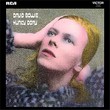|
|

Speakers' corner: David Bowie Following up our retro scope series of 2006 and 2007, 2009 and 2010 - here's the ever-continuing, never-stopping New Speakers' corner! Luna Kafé's focused eye on great events, fantastic happenings, absolute milestones, or other curious incidents from the historic shelves/vaults of rock. As many of the latest moonths retro-albums have been, it's yet another 40 year old. By one of the true gentlemen of popular music. An artist being a pure pop icon. A man of many faces and names. JP's got it right: The title is as appropriate as can be.
David
Bowie Hunky Dory was Bowie's fourth longplayer. He had a top five hit with the Pink-Floyd-of-the-Syd-Barrett-era-inspired single "Space Oddity" that was released to coincide with the first Moon landing in July 1969. But the album that followed soon after, firstly called David Bowie just like his debut album from 1967 (that incidentally was released on the very same day as The Beatles' Sgt. Pepper to somewhat less effect), later renamed Space Oddity, failed. The third The Man Who Fell To Earth gained more positive reviews, but never made it to the charts. When David started the recordings of Hunky Dory in April 1971 he didn't even have a contract. It was sorted out by September and the album was released on 17 December 1971, 40 years ago. It's a god-awful small
affair Hunky Dory gained even more favourable reviews and sold better than The Man Who Fell To Earth, but like its predecessors, it didn't chart. But her friend is nowhere
to be seen The opening track "Changes" was released as a single in January 1972. It made it to the lower ranks of the US charts, but didn't make it at home in Britain. Later it has been considered one of David's most central songs, a manifest - sort of - for his later frequent changes in musical style, looks, fashion, sexual preferences... It's a great little piano driven pop-piece with quiet verses and a chorus as catchy as can be. Great sax playing by the man himself and discreet strings, too. 'Time may change me, but I can't trace time'... But the film is a saddening
bore "Oh! You Pretty Things" is even catchier, another piano dominated song. There are six of them in all with the somewhat pub-flavoured piano played by a young Rick Wakeman. Rick had recently finished his stint with The Strawbs (with whom David Bowie had mimed a character from one of their songs at a Colour Me Pop programme at BBC TV in 1969) and was by now a member of the up-and-coming progressive combo Yes. But he still had time to do sessions, including Cat Stevens' (aka Yusuf Islam) mega hit "Morning Has Broken" a little before and Lou Reed's debut solo album recorded a little after Hunky Dory, to name but two. Strange, really, a few years later he was considered the king of pomp-progressive symphonic rock with performances that included a symphony orchestra and ice skaters. The ultimate hate object of the punks, uh? Sailors fighting in the
dance hall There are some homages on the album. "Andy Warhol" is obviously about the artist, an excellent dynamic piece pushed forward by a pair of acoustic guitars. There is the story of David presenting the song to Andy himself. Andy didn't particularly like it. He fancied David's shoes, though, and during the remaining 40 minutes of their meeting they talked about shoes... Take a look at the Lawman Velvet Underground was another great inspiration of Bowie's of the Warhol gang and "Queen Bitch" was obviously inspired by this legendary band. The electric guitar, though, is not quite in the Velvet vein. It might be the start of the glam rock guitar sound that was even more distinctive on Bowie's following album. It's on Amerika's tortured
brow "Song For Bob Dylan" is the third homage of the album. It really sounds like a vintage Dylan song, though he hardly sings about himself this way: 'Some words had truthful vengeance, They could pin us to the floor. Brought a few more people on, Put the fear in a whole lot more'. Again the electric guitar don't quite match a typical Dylan song. The funny thing is that the guitarist, Mick Ronson (Hull's finest - rip!) a few years later was a part of Dylan's Rolling Thunder Review band. See the mice in their
million hordes There are more great pop songs here. "Kooks" is obviously one of them, light and charming with the strings, merry piano, even that funny trumpet here and there. "Quicksand" is a bit heavier, at least the strings and those occasional Mellotron-bursts. It points a bit forward to "It Ain't Easy" of the following album, and we have to wait quite a while until the timely and delightful chorus. Even the most anonymous track of the album, "The Bewlay Brothers" at the very end has shapes of things to come, especially David's deep throat vocals of the final bars of the song. But the film is a saddening
bore One more song left that really deserves to be mentioned, "Life On Mars". Here Rick Wakeman's piano sounds more pompous than on the other songs. The same goes for Ronson's guitar and the dominant string section even more so. Almost too much strings for its own good. Well, the song balances on the verge of being pompous, and perhaps it is. Even so, it's got an irresistible chorus; it gives me the shivers every time I hear it. Bowie's best song ever? Yes, I think so. No wonder it has given the name to a TV series. And - as you can see around here - the lyrics haven't even anything to do with any kind of insects from the planet mentioned in the following album title. Sailors fighting in the
dance hall Hunky Dory and its single didn't receive the massive success it deserved at the time they were released. Maybe they were a few months ahead of their time? But the following album Ziggy Stardust And The Spiders From Mars (released in June 1972) and the single "Starman" certainly did. In the wake of the success RCA was quick to re-launch parts of Bowie's back catalogue. "Space Oddity", both the single and album, charted along with The Man Who Fell To Earth. Hunky Dory went to no. 3 in the British charts in latter half 1972 and when "Life On Mars" was launched as a single in June 1973 it also made it to no. 3. Take a look at the Lawman I'm not sure if Hunky Dory is Bowie's best album. It's certainly a strong contender. It's not groundbreaking like the man's first two Berlin albums, Low and Heroes. But it's no less than an excellent pop album. If you ask me, of its 11 songs, about five might make it into Bowie's top 10 ever. The album title is as appropriate as can be! Copyright © 2011 JP
|
| You may also want to check out our David Bowie articles/reviews: Blackstar, Lazarus, Quart Festival, Norway 03.07.2002, Studio albums, 1967-2016. |
| © 2011 Luna Kafé |
